FREQUENTLY ASKED QUESTIONS
-
FREQUENTLY ASKED QUESTIONS -
-
Fresh Winter's Turkeys products are available at Thanksgiving and Christmas seasonally. Here is a link to our retailers carrying our product fresh for the holidays.
-
Fresh turkeys and fresh turkey products are available seasonally at Thanksgiving and Christmas. However, if you are looking for turkey throughout the year, our turkeys and complete product list are frozen in stores and on our online store.
-
Please check our list of distributors.
-
A baby turkey is called a poult. An adult female turkey is called a hen. An adult male turkey is called a tom.
-
All licensed turkey producers in Alberta must meet the requirements of the On-Farm Food Safety Program and The Flock Care Program. Alberta Turkey Producers and Turkey Farmers of Canada administer these programs.
-
All of Winter's Turkeys are free-range. Free range means that our birds have free and unfettered access to the outdoors. On our farm, this means that the birds have fenced runs behind each barn that the turkeys have access to year-round. As a result, the turkey's range is filled with grass, hay, branches to perch on and plants to peck at.
-
One of our flocks for each festive season is raised as Certified Organic. Certified organic describes how the turkeys are raised and, more specifically, what those turkeys eat. All of the feed rations for this flock are certified organic. In addition, Ecocert Canada visits our farm annually to audit our facilities and to certify Winter's Turkeys for each production year.
-
We primarily raise Broad Breasted White turkeys. These are the most common turkey grown worldwide. This breed was intentionally developed for meat production and for feather colour. Broad Breasted White turkeys have ample breast meat, and their pin feathers are less visible when the turkey is prepared and dressed because the feathers are white.
-
We raise an Heirloom Orlopp Bronze turkey for our certified organic flocks. Heirloom turkeys are a group of domesticated birds bred for generations while maintaining their native traits. Heirloom turkeys are smaller and have less white meat than commercial turkeys. As a result, these turkeys produce exquisite meat with an exceptional, rich flavour that's tender and juicy.
-
Yes. Our birds are introduced to the outdoors at three weeks of age and have unlimited access to the outdoors at five weeks of age.
-
Our turkeys are fed a feed program developed by Darrel's dad, Jack Winter, and perfected over the generations. All Winter's Turkeys are fed a whole grain diet primarily with a whole wheat base.
Feed Program:
On our farm, turkeys arrive as day-old poults. Our poults are fed a fine, crumbled feed for the first four weeks. This crumble is produced at a feed plant in Southern Alberta. Then, starting at week five, we add increasing amounts of whole wheat to the birds' rations. This amount rises weekly until around week 14 when the birds eat 90% whole wheat. Grandpa Jack started the original feed program, which has been updated and approved by nutritionists to ensure that we are meeting the nutritional needs of the turkeys.
Our organic turkey feed is mixed entirely on the farm for the entire lifespan of the birds. Our organic flock is fed organic wheat, organic soy meal, organic flax or canola meal, organic peas, and minerals. We mill and grind the wheat and peas for the first five weeks and then begin mixing in whole wheat as the flock matures.
-
We use all collagen casings for our turkey pepperoni sticks.
-
🦃 Step 1: Keep It Wrapped
Leave the turkey in its original packaging to prevent contamination.
💧 Step 2: Submerge in Cold Water
Fill a large sink or container with cold water.
Fully submerge the turkey breast-side down in the water.
⏳ Step 3: Change Water Regularly
Change the water every couple of hours to keep it cold and safe.
Never use warm or hot water, as this can promote bacterial growth.
📏 Step 4: Thawing Time
Allow 1 hour per pound (2.2 lbs = 1 kg) for proper thawing.
Example: A 12 lb (5.4 kg) turkey will take about 12 hours to thaw.
An 8 kg turkey will take approximately 18 hours to thaw.
🍗 Step 5: Cook Immediately
Once fully thawed, cook the turkey right away.
Do not refreeze a thawed turkey.
-
The "natural smoke" in our smoked turkey products comes from burning real wood chips during the smoking process, not from adding any artificial ingredients. This traditional smoking process imparts the authentic flavour that makes our smoked turkey products so delicious.
-
We do not use sodium nitrate in any of our products. Instead, we rely on natural smoke and high-quality cultured celery powder to naturally cure our smoked meat products.
-
We are now delighted to provide Alberta-wide shipping for everything south of Fort Saskatchewan, including Airdrie, Alberta, Aldersyde, Ardrossan, Banff, Beaumont, Bearspaw, Bentley/Gull Lake, Black Diamond, Blackfalds, Bowden, Bragg Creek, Brooks, Bergen, Calgary, Camrose, Canmore, Caroline, Carstairs, Chestermere, Claresholm, Cochrane, Cooking Lake, Cremona, Crossfield, Devon, DeWinton, Didsbury, Edmonton, Exshaw, Fort Macleod, Fort Sask., Ghost Lake, Harvie Heights, High River, Innisfail, Irricana, Kathrine, Knee Hill Valley, Lacombe, Langdon, Leduc, Lethbridge, Medicine Hat, Millet, Millarville, Okotoks, Olds, Penhold, Pincher Creek, Ponoka, Priddis, Red Deer, Redwood Meadows, Rocky Mountain House, Sherwood Park, Springbank, Spruce Grove, St. Albert, Stony Plain, Strathmore, Sundre, Sylvan Lake, Taber, Three Hills, Torrington, Turner Valley, Vulcan, Water Valley, Wetaskiwin, and Wizard Lake.
-
GETTING YOUR PRODUCTS
Farm Pick-up: We will email you when your order is ready for pick-up (72-hour processing time). Pick-up days are Wednesday 12-6 pm & Friday 12-4 pm each week; please call on arrival. Farm Pick-up in Dalemead, Alberta
Delivery: Enjoy our local delivery service in Calgary for a $12.50 fee on your order. Please note we deliver each Thursday and Friday. Orders must be placed by Sunday at 11:59 pm for delivery that week. Calgary Residents Only -
Fresh, whole turkeys are generally only available during the holiday seasons in Canada. However, if you are looking for turkey throughout the year, our entire product line is frozen.
-
A fresh turkey can be safely stored until the 'Best Before Date' in a fridge, less than 4 degrees Celsius, or in a cooler packed with ice and kept in a cool place or your freezer in an insulated bag.
-
Our turkeys can be kept fresh until the 'Best Before Date.' However, if you plan on cooking your turkey on a date different than the best-before date, freeze it as soon as possible.
-
A fresh turkey is best frozen immediately after purchase and before the 'Best Before Date.'
-
We recommend cooking your frozen turkey within 12 months; however, if well frozen, your bird will be good for up to 2 years.
-
This piece is called a leg hock, with two arms with hooks at each end. This piece is food safe, so cooking the turkey with the piece in is fine if you wish. To remove the leg hock, push it in, squeeze the two arms together and rotate to remove it.
-
The general rule is to plan for 1 to 1.5 pounds or 500 grams of meat per guest. If you are interested in boneless meat, assume about 8 ounces per guest. This will vary depending on how big of eaters you are hosting if you have other protein options, and how many leftovers you prefer.

